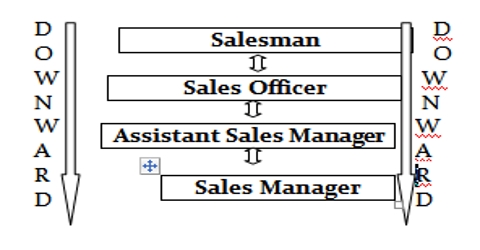Essential Elements and Effectiveness of Downward Communication
Downward communication is the most effective way to direct, supervise, and guide the employees for attaining organizational goals. Success of downward communication depends on some factors / elements that are discussed below:
Adequate knowledge of managers: Managers should acquire adequate knowledge on the objectives, plans and policies of the organization. If managers are well informed of these matters they can effectively communicate with their subordinates.
Positive communication attitude: In order to make downward communication effective, managers need to develop a positive communication attitude. They must realize the necessity of communicating continuously with the subordinates for achieving organizational goals.
Developing communication plan: Managers must prepare a plan for communication and follow the plan while communicating with the subordinates. A good communication plan contains how much information is to communicate, when, and how to communicate and to whom it will be communicated.
Shortening the communication line: Messages of downward communication pass through various levels of hierarchy. This causes distortion or even loss of information. To overcome this problem, organization should develop a flat structure. This will shorten the communication lines, eliminate unnecessary delay, and minimize the possibility of loss and distortion of message.
Transmitting information through the right person: Effectiveness of downward communication significantly depends on the transmission of information through the right persons and positions or the organization hierarchy. No one should send Message to the lower level people by passing one’s immediate subordinate.
Using proper media: In order to make downward communication effective, communication should use officially recognized channels or media. Sometimes they can use informal channel to supplement the formal channels.
Providing necessary explanation: Success of communication depends on proper undemanding of the message by the receiver. Keeping this in mind, superiors should provide necessary explanations of the message so that the subordinates can perceive it clearly.
Building trust: Another prerequisite of effective downward communication is that managers must build trust with their subordinates. Trust between sender and receiver is very important for successful communication. If the employees do not trust their superiors, they may not give due importance to the superiors message.
The above stated elements will make downward communication effective and help the organization in performing. Its activities successfully. Therefore, management must give proper attention to the above stated elements.















